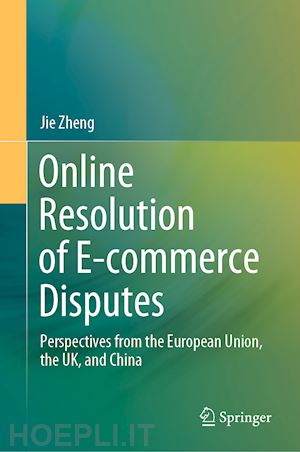
Questo prodotto usufruisce delle SPEDIZIONI GRATIS
selezionando l'opzione Corriere Veloce in fase di ordine.
Pagabile anche con Carta della cultura giovani e del merito, 18App Bonus Cultura e Carta del Docente
This book discusses how technological innovations have affected the resolution of disputes arising from electronic commerce in the European Union, UK and China. Online dispute resolution (ODR) is a form of alternative dispute resolution in which information technology is used to establish a process that is more effective and conducive to resolving the specific types of dispute for which it was created.
This book focuses on out-of-court ODR and the resolution of disputes in the field of electronic commerce. It explores the potential of ODR in this specific e-commerce context and investigates whether the current use of ODR is in line with the principles of access to justice and procedural fairness. Moreover, it examines the major concerns surrounding the development of ODR, e.g. the extent to which electronic ADR agreements are recognized by national courts in cross-border e-commerce transactions, how procedural justice is ensured in ODR proceedings, and whether ODR outcomes can be effectively enforced. To this end, the book assesses the current and potential role of ODR in resolving e-commerce disputes, identifies the legal framework for and legal barriers to the development of ODR, and makes recommendations as to the direction in which practice and the current legal framework should evolve.In closing, the book draws on the latest legislation in the field of e-commerce law and dispute resolution in order to make recommendations for future ODR design, such as the EU Platform-to-Business Regulation on Promoting Fairness and Transparency for Business Users of Online Intermediation Services (2019) and the United Nations Convention on International Settlement Agreements Resulting from Mediation (2018), which provide the legal basis for ODR’s future development.
Chapter 1. Introduction
1.1. The Interplay Between Electronic Commerce and Online Dispute Resolution
1.2. Contribution to the Current Academic World of ODR
1.3. Research Scope
1.3.1. Selected Jurisdiction
1.3.2. Thematic Scope of The Study
1.4. Research Question
1.5. Methodology
1.6. Structure of the Book
Chapter 2. Conceptual Settings
2.1. Electronic Commerce and Disputes Arising from Electronic Commerce2.1.1. Definition Of “E-Commerce”
2.1.2. Major Types of E-Commerce Transactions
2.1.3. Characteristics of E-Commerce Disputes
2.2. Electronic Contract Rules
2.2.1. International Legal Instruments on Electronic Contract Rules
2.2.2. Legal Principles of Electronic Communications
Chapter 3. The Development of ODR In E-Commerce Transactions
3.1. Theory of ODR
3.1.1. Definition of ODR
3.1.2. Development of ODR
3.1.3. Forms of ODR
3.1.4. Connections Between ADR and ODR
3.2. ADR and ODR in the EU
3.2.1. ADR Development in the EU
3.2.2. Current Legal Instruments on ADR in the EU
3.3. ADR and ODR in England
3.3.1. ADR Development in England
3.3.2. Current Legal Instruments in England
3.3.3. ODR Development in the Direction of Online Court3.4. ADR and ODR in China
3.4.1. ADR Development in China
3.4.2. Current ADR Mechanism in China
3.4.3. China ODR Development Towards a Diversified Dispute Resolution Mechanism
3.5. Comparison of ODR And ADR Development Among the EU, England, and China
Chapter 4. Validity of Electronic Alternative Dispute Resolution Agreements
4.1. Formal Validity Requirements of E-ADR Agreements
4.1.1. Direct Formal Validity Requirements in ADR Legislation
4.1.2. Indirect Formal Validity Requirements: ADR Agreements Concluded in Electronic Form
4.2. Substantive Validity Requirement to E-ADR Agreement
4.2.1. Electronic Consent in Standard Form Contracts
4.2.2. The Application of EU Public Policy to Judicial Review of ADR Agreements
4.2.3. Case Study on E-ADR Agreements in England
4.2.4. Case Study of E-ADR Agreements in China
4.2.5. Sub-Conclusion
4.3. Preliminary Conclusion
Chapter 5. ODR Procedural Standards5.1. Sources of ODR Procedural Justice
5.1.1. Technical Notes on ODR Issued by UNCITRAL Working Group III
5.1.2. Procedural Principles from Civil Procedure Law
5.1.3. ADR Principles and Rules
5.1.4. Special Procedural Matters of ODR
5.2. Application of ODR Principles to Selective ODR Rules in E-Commerce Disputes
5.2.1. Online Arbitration
5.2.2. Internal Complaint Mechanism of Third-Party Online Platform
5.2.3. Domain Name Dispute Resolution5.3. Preliminary Conclusion
5.3.1. Challenges to the ODR Development
5.3.2. Proposed Solutions to Improve Justice in ODR Proceedings
Chapter 6. Enforcement of the ODR Outcomes
6.1. Public Enforcement: Judicial Measures
6.1.1. Enforcement of Online Commercial Arbitral Awards
6.1.2. Enforcement of Online Mediated Settlement Agreements
6.1.3. Sub-conclusion
6.2. Private Enforcement: Extra-judicial Measures6.2.1. Automatic Execution of ODR Decisions
6.2.2. Incentive-Driven Enforcement Mechanism
6.2.3. Sub-conclusion
6.3. Preliminary Conclusion
Chapter 7. Conclusion
7.1. Challenges to the Future ODR Development
7.1.1. Cross-Border Recognition of E-ADR Agreements
7.1.2. Lack of Procedural Fairness in ODR
7.1.3. Lack of Enforceability Mechanism for ODR Outcomes
7.2. Recommendations for the Future ODR System Design7.2.1. Establish Common Grounds in Recognizing the Validity of E-ADR Agreements
7.2.2. Improve Procedural Fairness In ODR
7.2.3. Enhance the Enforcement Mechanism of ODR Outcomes
7.3. ODR Development in the Future
Annex 1. Guangzhou Arbitration Commission (Gzac) Online Arbitration Rules
Annex 2. Alibaba’s Standard of Penalty Points Incurred for Non-Compliance Of
Transactions
List of Abbreviations
Bibliography
Jie Zheng is a Lecturer and Researcher at Shanghai University of Finance and Economics, Shanghai, China, with a focus on dispute resolution and information technology, a Former Junior Associate at Burkardt Peters & Partner, Shanghai, as well as a former Researcher at Transnational Law Center, Ghent University, Belgium.











Il sito utilizza cookie ed altri strumenti di tracciamento che raccolgono informazioni dal dispositivo dell’utente. Oltre ai cookie tecnici ed analitici aggregati, strettamente necessari per il funzionamento di questo sito web, previo consenso dell’utente possono essere installati cookie di profilazione e marketing e cookie dei social media. Cliccando su “Accetto tutti i cookie” saranno attivate tutte le categorie di cookie. Per accettare solo deterninate categorie di cookie, cliccare invece su “Impostazioni cookie”. Chiudendo il banner o continuando a navigare saranno installati solo cookie tecnici. Per maggiori dettagli, consultare la Cookie Policy.